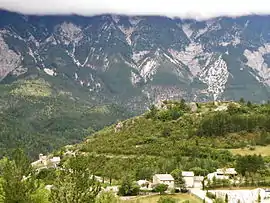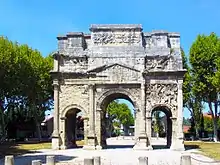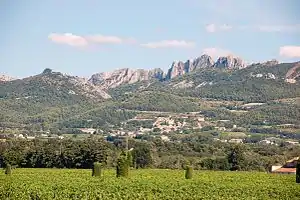Vaucluse
Vaucluse (French: [voklyz]; Provençal: Vauclusa (Classical norm) or Vau-Cluso (Mistralian norm)) is a department in southeastern France, located in the Provence-Alpes-Côte d'Azur region. It had a population of 559,014 as of 2016.
Vaucluse
| |
|---|---|
  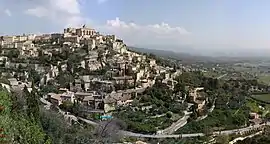 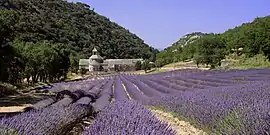   From top down, left to right: prefecture building and Palais des Papes in Avignon, Gordes (one of the most beautiful villages of France), Sénanque Abbey, Sorgues River and Nesque River | |
 Flag 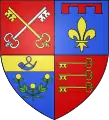 Coat of arms | |
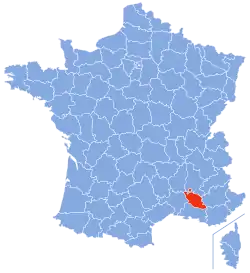 Location of Vaucluse in France | |
| Coordinates: 44°00′N 05°10′E | |
| Country | France |
| Region | Provence-Alpes-Côte d'Azur |
| Prefecture | Avignon |
| Subprefectures | Apt Carpentras |
| Government | |
| • President of the Departmental Council | Maurice Chabert (LR) |
| Area | |
| • Total | 3,567 km2 (1,377 sq mi) |
| Population (2016) | |
| • Total | 559,014 |
| • Rank | 48th |
| • Density | 160/km2 (410/sq mi) |
| Time zone | UTC+1 (CET) |
| • Summer (DST) | UTC+2 (CEST) |
| Department number | 84 |
| Arrondissements | 3 |
| Cantons | 17 |
| Communes | 151 |
| ^1 French Land Register data, which exclude estuaries, and lakes, ponds, and glaciers larger than 1 km2 | |
It is named after the famous Fontaine de Vaucluse spring; the name Vaucluse itself derives from the Latin Vallis Clausa ("Closed Valley") as the valley ends in a cliff face from which emanates a spring whose origin is so far in and so deep that it remains to be defined. The department's prefecture is Avignon.
History
Vaucluse was created on 12 August 1793 out of parts of the departments of Bouches-du-Rhône, Drôme and Basses-Alpes, later renamed Alpes-de-Haute-Provence. The then rural department was, like the nearby city of Lyon, a hotbed of the French Resistance in World War II.
Geography
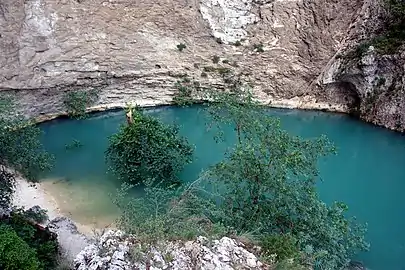
Vaucluse is bordered by the Rhône to the west and the Durance to the south. Mountains occupy a significant proportion of the eastern half of the department, with Mont Ventoux (1,912 m), also known as "the Giant of Provence", dominating the landscape. Other important mountain ranges include the Dentelles de Montmirail, the Monts de Vaucluse and the Luberon. Fruit and vegetables are cultivated in great quantities in the lower-lying parts of the department, on one of the most fertile plains in Southern France. The Vaucluse department has a rather large exclave within the Drôme department, the canton of Valréas (Enclave des Papes).
Vaucluse is also known for its karst, including the karst spring Fontaine de Vaucluse after which "Vauclusian Risings" are named. Important urban centres include Avignon, Orange, Carpentras, Cavaillon and Apt.
Demographics
- Urban population: 416,301 (83%)
- Rural population: 83,384 (17%)
Population development since 1801:
| Year | Pop. | ±% p.a. |
|---|---|---|
| 1801 | 191,421 | — |
| 1806 | 205,833 | +1.46% |
| 1821 | 224,431 | +0.58% |
| 1831 | 239,113 | +0.64% |
| 1841 | 251,080 | +0.49% |
| 1851 | 264,618 | +0.53% |
| 1861 | 268,255 | +0.14% |
| 1872 | 263,451 | −0.16% |
| 1881 | 244,149 | −0.84% |
| 1891 | 235,411 | −0.36% |
| 1901 | 236,949 | +0.07% |
| 1911 | 238,656 | +0.07% |
| 1921 | 219,602 | −0.83% |
| 1931 | 241,689 | +0.96% |
| 1936 | 245,508 | +0.31% |
| 1946 | 249,838 | +0.17% |
| 1954 | 268,318 | +0.90% |
| 1962 | 303,536 | +1.55% |
| 1968 | 353,966 | +2.59% |
| 1975 | 390,446 | +1.41% |
| 1982 | 427,343 | +1.30% |
| 1990 | 467,075 | +1.12% |
| 1999 | 499,685 | +0.75% |
| 2006 | 534,291 | +0.96% |
| 2011 | 546,630 | +0.46% |
| 2016 | 559,014 | +0.45% |
| source:[1] | ||
Politics
Departmental Council
Following the 2015 departmental election, Maurice Chabert of The Republicans was elected President of the Departmental Council. He succeeded Claude Haut, a member of the Socialist Party, who had held the office since 2001.
The Departmental Council of Vaucluse has 34 seats. The Left Front (FG) currently has 2 seats, the Socialist Party (PS) has 7, Europe Ecology – The Greens (EELV) has 3, the miscellaneous right (DVD) has 2, The Republicans (LR) have 10, the National Rally has 6 and a local party, the Ligue du Sud (LS), has 4.
Members of the National Assembly
During the 2017 legislative election, Vaucluse elected the following representatives to the National Assembly:[2]
On 21 July 2017, Poirson resigned from office to join the Second Philippe government as Secretary of State to the Minister for the Ecological and Inclusive Transition. She was replaced in the National Assembly by Adrien Morenas.
See also
References
- Site sur la Population et les Limites Administratives de la France
- List of members for Vaucluse (in French), on www.nosdeputes.fr.
External links
- Vaucluse at Curlie
- (in French) Website of the Departmental Council
- (in French) Prefecture website



